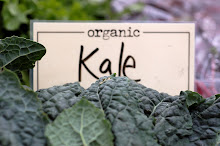.jpg) Preserving fruit into jars for the season has come to an end and I left the kitchen to see the documentary, Vanishing of the Bees. To be honest I didn't expect much. I read the news, I know the story line; the bees are dieing, it's called Colony Collapse Disorder and there are different theories on the why. The movie told a bigger story though and damn if it didn't get to me; laughter, tears. I left knowing more than when I arrived.
Preserving fruit into jars for the season has come to an end and I left the kitchen to see the documentary, Vanishing of the Bees. To be honest I didn't expect much. I read the news, I know the story line; the bees are dieing, it's called Colony Collapse Disorder and there are different theories on the why. The movie told a bigger story though and damn if it didn't get to me; laughter, tears. I left knowing more than when I arrived.
I learned California almond growers upon facing a deficit of bee colonies in recent years imported colonies from Australia. There was footage of the bees on crates loaded by forklift into the belly of a jet. All those little bee suitcases. Kidding. Only about the suitcases. They really imported bees.
Then I learned honey from China is honey plus. It's some part honey with additional ingredients and sold as honey. There were oil barrels of the stuff; honey with lactose, honey with high fructose corn syrup. Which naturally makes it tough for US beekeepers to get a straight price for straight honey. It was another dilemma.
The Vanishing of the Bees is filled with dilemma, filled with drama. There were french beekeepers taking up their arms in the streets of Paris, an organic beekeeper fleeing a gmo corn monoculture to a friendlier farm in Vermont. There was a bonfire of bee boxes after a massive colony collapse, there was a hearing in Washington, DC; corporations not taking responsibility. There were genetically modified seeds impregnated with pesticides.
And there was heart. The big beekeepers in the documentary, competitors, were also friends. When their colonies began collapsing they began talking every day, became each others support. One admitted to talking to his bees. They went to France. They talked to beekeepers there. Their caring beyond business, beyond profits was apparent. As was their fear. Without bees we're all without more than another industry that can't survive.
In came the small organic beekeepers though. They weren't a complete solution but part of one. As were the people planting gardens to attract bees, people buying organic, people choosing products without gmo ingredients. There were as many pieces to the solution of the vanishing of the bees as there were to the problem.
It's a good film. Watch it if you can.
10 hours ago

7 comments:
sigh. so nice to read you again.
Thanks for this post. I did not know about Chinese honey diluted with other ingredients. Although I never buy Chinese products any longer for various reasons (too many to list here), I'm glad to reaffirm the reasons why I am buying local once again. I'm sure to watch the documentary.
Of course I love bees, but I REALLY LOVE native bees. If you have the chance to read A Blessing of .
Toads, A Gardener's Guide to Living with Nature," you'll learn about Orchard Mason bees and other natives...bumblebees, etc. Mason bees are able to pollinate long before imported honey bees can get out to work their magic. I think honey bees need about a 55 degree temp, but the Mason bees are already at work ensuring a fruit crop. Although our native bees aren't social (hives) they do a good job, but they don't make honey.
I miss your writing when you're away,
Cheers,
Sharon Lovejoy Writes from Sunflower House and a Little Green Island
P.S. Trader Joe's has really surprised me with lots of Chinese products (canned beans etc.) I return them and tell them why I don't want them.
LOCAL, LOCAL, LOCAL, LOCAL!
Kelly - You're the best. Thank you.
Kumi - Those cats! How nice to see those cats again. I reaffirmed buying local again too by going away for a few days. All fun but how nice to return home to our own food.
Sharon Lovejoy - I love a good label reader! Yes! Thanks for the recommendation of the book, what a great title, and the information about the native bees. There was nothing in this film about native bees and they certainly sound deserving of at least a supporting role. One story at a time I suppose. The native bees go onto the list of solutions. The good news grows.
Hi Katrina, thanks for this great post. I felt like we saw more pollinators around the garden this year, in spite of the bad weather, maybe because of all of the mini beekeeping operations that are springing up. If you haven't you might check out Rowan Jacobsen's Fruitless Fall. Great book about same.
Audrey - There were more pollinators on my back deck too. I actually got a few squash when years before there were only blossoms, which I also enjoyed but the squash, they're something else. Thanks for the tip on the book. I haven't heard of it before but will look for it now.
Post a Comment